新概念第二册 L19 第19课教案
- 格式:pdf
- 大小:1.22 MB
- 文档页数:7
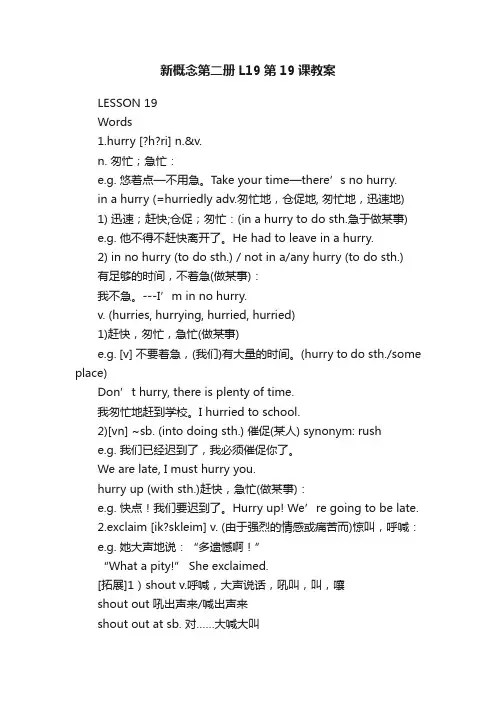
新概念第二册L19第19课教案LESSON 19Words1.hurry [?h?ri] n.&v.n. 匆忙;急忙:e.g. 悠着点—不用急。
Take your time—there’s no hurry.in a hurry (=hurriedly adv.匆忙地,仓促地, 匆忙地,迅速地)1) 迅速;赶快;仓促;匆忙:(in a hurry to do sth.急于做某事)e.g. 他不得不赶快离开了。
He had to leave in a hurry.2) in no hurry (to do sth.) / not in a/any hurry (to do sth.)有足够的时间,不着急(做某事):我不急。
---I’m in no hurry.v. (hurries, hurrying, hurried, hurried)1)赶快,匆忙,急忙(做某事)e.g. [v] 不要着急,(我们)有大量的时间。
(hurry to do sth./some place)Don’t hurry, there is plenty of time.我匆忙地赶到学校。
I hurried to school.2)[vn] ~sb. (into doing sth.) 催促(某人) synonym: rushe.g. 我们已经迟到了,我必须催促你了。
We are late, I must hurry you.hurry up (with sth.)赶快,急忙(做某事):e.g. 快点!我们要迟到了。
Hurry up! We’re going to be late.2.exclaim [ik?skleim] v. (由于强烈的情感或痛苦而)惊叫,呼喊:e.g. 她大声地说:“多遗憾啊!”“What a pity!” She exclaimed.[拓展]1)shout v.呼喊,大声说话,吼叫,叫,嚷shout out 吼出声来/喊出声来shout out at sb. 对……大喊大叫2)scream v. (因伤痛、害怕、激动等)尖叫、惨叫、惊叫exclamation[?ekskl??me??n] n. 感叹;感叹语;感叹词exclamation mark 感叹号3.return v. 1) 回来;回去;返回e.g. 你什么时候回到伦敦?When are you returning to London?2) 带回;送回;放回;归还,退还~sb./sth.(to sb./sth.)e.g.我准备去图书馆还书。
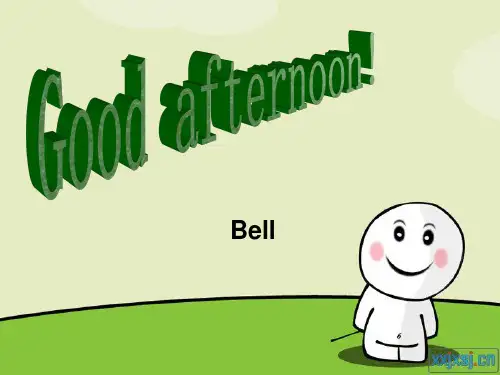
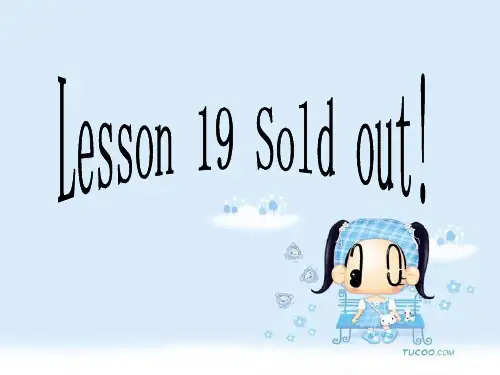
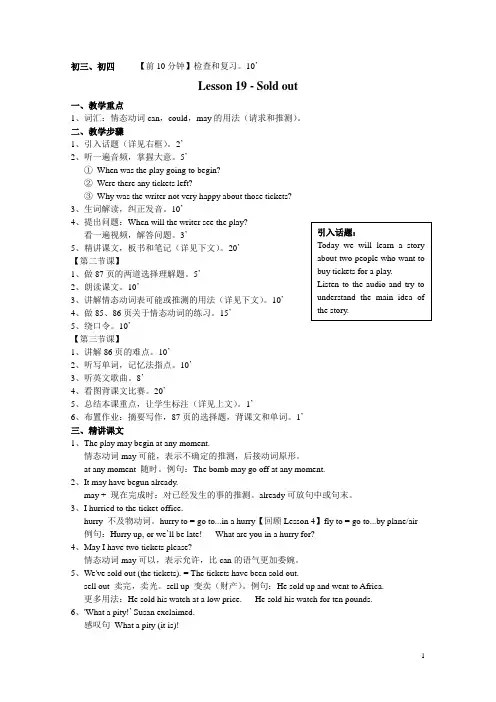
初三、初四【前10分钟】检查和复习。
10’Lesson 19 - Sold out一、教学重点1、词汇:情态动词can,could,may的用法(请求和推测)。
二、教学步骤1、引入话题(详见右框)。
2’2、听一遍音频,掌握大意。
5’①When was the play going to begin?②Were there any tickets left?③Why was the writer not very happy about those tickets?3、生词解读,纠正发音。
10’4、提出问题:When will the writer see the play?5、精讲课文,板书和笔记(详见下文)。
20’【第二节课】1、做87页的两道选择理解题。
5’2、朗读课文。
10’3、讲解情态动词表可能或推测的用法(详见下文)。
10’4、做85、86页关于情态动词的练习。
15’5、绕口令。
10’【第三节课】1、讲解86页的难点。
10’2、听写单词,记忆法指点。
10’3、听英文歌曲。
8’4、看图背课文比赛。
20’5、总结本课重点,让学生标注(详见上文)。
1’6、布置作业:摘要写作,87页的选择题,背课文和单词。
1’三、精讲课文1、The play may begin at any moment.情态动词may可能,表示不确定的推测,后接动词原形。
at any moment 随时。
例句:The bomb may go off at any moment.2、It may have begun already.may + 现在完成时:对已经发生的事的推测。
already可放句中或句末。
3、I hurried to the ticket-office.hurry 不及物动词。
hurry to = go to...in a hurry【回顾Lesson 4】fly to = go to...by plane/air 例句:Hurry up, or we’ll be late! What are you in a hurry for?4、May I have two tickets please?情态动词may可以,表示允许,比can的语气更加委婉。
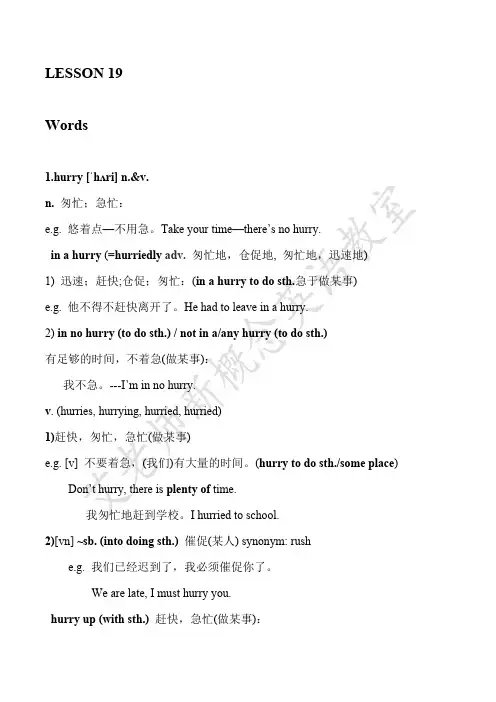
LESSON 19Words1.hurry [ˈhʌri] n.&v.n. 匆忙;急忙:e.g. 悠着点—不用急。
Take your time—there’s no hurry.in a hurry (=hurriedly adv.匆忙地,仓促地, 匆忙地,迅速地)1) 迅速;赶快;仓促;匆忙:(in a hurry to do sth.急于做某事)e.g. 他不得不赶快离开了。
He had to leave in a hurry.2) in no hurry (to do sth.) / not in a/any hurry (to do sth.)有足够的时间,不着急(做某事):我不急。
---I’m in no hurry.v. (hurries, hurrying, hurried, hurried)1)赶快,匆忙,急忙(做某事)e.g. [v] 不要着急,(我们)有大量的时间。
(hurry to do sth./some place)Don’t hurry, there is plenty of time.我匆忙地赶到学校。
I hurried to school.2)[vn] ~sb. (into doing sth.) 催促(某人) synonym: rushe.g. 我们已经迟到了,我必须催促你了。
We are late, I must hurry you.hurry up (with sth.)赶快,急忙(做某事):e.g. 快点!我们要迟到了。
Hurry up! We’re going to be late.2.exclaim [ikˈskleim] v. (由于强烈的情感或痛苦而)惊叫,呼喊:e.g. 她大声地说:“多遗憾啊!”“What a pity!” She exclaimed.[拓展]1)shout v.呼喊,大声说话,吼叫,叫,嚷shout out 吼出声来/喊出声来shout out at sb. 对……大喊大叫2)scream v. (因伤痛、害怕、激动等)尖叫、惨叫、惊叫exclamation[ˌekskləˈmeɪʃn] n. 感叹;感叹语;感叹词exclamation mark 感叹号3.return v. 1) 回来;回去;返回e.g. 你什么时候回到伦敦?When are you returning to London?2) 带回;送回;放回;归还,退还~sb./sth.(to sb./sth.)e.g.我准备去图书馆还书。
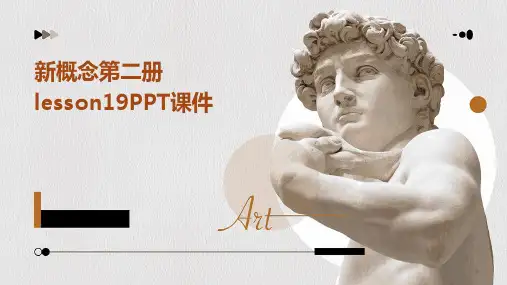
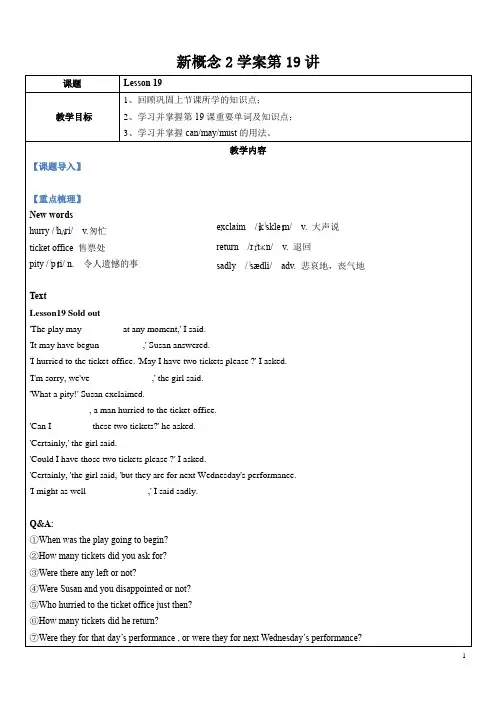
新概念2学案第19讲⑧Did you buy them or not?一、重要知识点1. Sold outsell v.v. 过去时___________过去分词________________标题中的sold out 前被省略了____________________。
例题精讲The cake ________well. Today’s cakes ______________ at 11:00 a.m.A.is sold; were sold outB.sells; were sold outC. is sold ; sold outD.sells;sold out总结:当表示“销售好、卖的好”时,表达方式为_____________________, _______(有/无) 被动语态;当表示“卖光”时,表达方式为_____________________, _______(有/无) 被动语态;助记n. _____________ 销售,销售量✧This computers are in the factory now and three days later they will be for sale.✧Almost everything is on sale on the Internet on 11th November.总结:__________________________________________________________2.'The play may begin at any moment,' I said.关于moment的短语①You can come to me ___________________________, because we are best friends.②______________________, he was listening to the radio. That was why he didn’t hear the knock on the door.【等你来挑战】一、将课文补充完整。

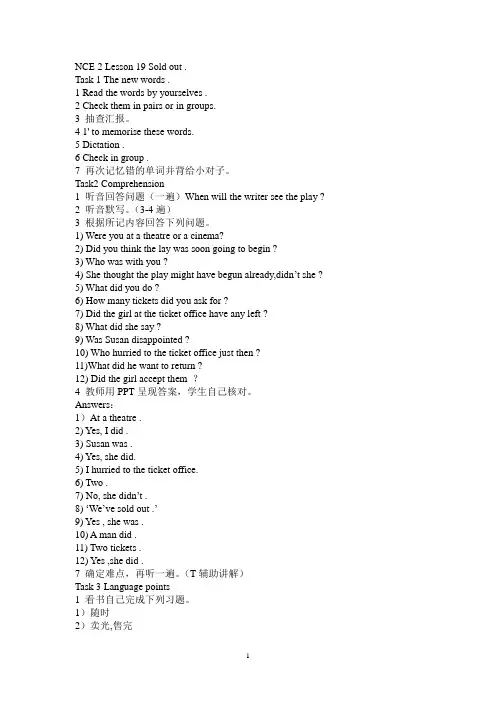
NCE 2 Lesson 19 Sold out .Task 1 The new words .1 Read the words by yourselves .2 Check them in pairs or in groups.3 抽查汇报。
4 1' to memorise these words.5 Dictation .6 Check in group .7 再次记忆错的单词并背给小对子。
Task2 Comprehension1 听音回答问题(一遍)When will the writer see the play ?2 听音默写。
(3-4遍)3 根据所记内容回答下列问题。
1) Were you at a theatre or a cinema?2) Did you think the lay was soon going to begin ?3) Who was with you ?4) She thought the play might have begun already,didn’t she ?5) What did you do ?6) How many tickets did you ask for ?7) Did the girl at the ticket office have any left ?8) What did she say ?9) Was Susan disappointed ?10) Who hurried to the ticket office just then ?11)What did he want to return ?12) Did the girl accept them ?4 教师用PPT呈现答案,学生自己核对。
Answers:1)At a theatre .2) Yes, I did .3) Susan was .4) Yes, she did.5) I hurried to the ticket office.6) Two .7) No, she didn’t .8) ‘We’ve sold out .’9) Yes , she was .10) A man did .11) Two tickets .12) Yes ,she did .7 确定难点,再听一遍。

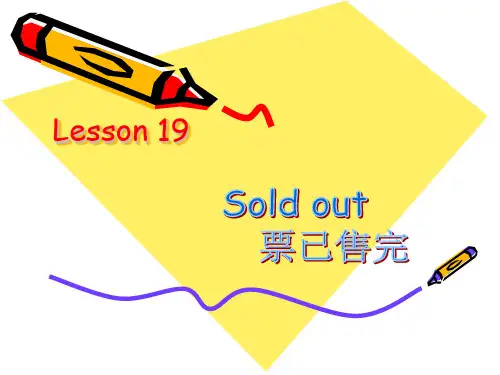
新概念第二册第19课课件一、教学目标1.知识与技能:学生能够理解并运用本课所学的词汇和句型,描述家庭成员及其职业。
2.过程与方法:通过听、说、读、写等多种方式,提高学生的英语交际能力。
3.情感态度与价值观:培养学生热爱家庭、尊敬长辈的情感,增强对英语学习的兴趣。
二、教学内容1.词汇:father,mother,brother,sister,doctor,teacher,driver,worker2.句型:Whatdoesyourfatherdo?Heisadoctor.Whataboutyourmother?Sheisa teacher.三、教学重点与难点1.教学重点:掌握词汇和句型,能够描述家庭成员及其职业。
2.教学难点:正确使用句型进行交际,注意家庭成员称谓的用法。
四、教学过程1.热身活动(5分钟)老师与学生用英语进行自我介绍,互相询问家庭成员。
学生两人一组,用英语描述自己的家庭成员。
2.词汇学习(10分钟)老师展示图片,引导学生学习新词汇。
学生跟读并模仿发音,注意家庭成员称谓的用法。
3.句型学习(10分钟)老师示范句型的用法,引导学生进行模仿。
学生两人一组,用句型进行问答练习。
4.听力练习(10分钟)老师播放录音,学生听并回答问题。
学生两人一组,进行听力练习。
5.口语练习(10分钟)老师组织学生进行角色扮演,模拟家庭成员的交际场景。
学生两人一组,进行口语练习。
6.作业布置(5分钟)学生回家后,用英语向家人介绍家庭成员及其职业。
完成课后练习题。
五、教学评价1.课堂表现:观察学生在课堂上的参与程度、积极性和合作精神。
2.作业完成情况:检查学生作业的准确性和完整性。
3.口语表达能力:评估学生在口语练习中的表达能力和交际能力。
六、教学反思1.教师应注重培养学生的听、说、读、写综合能力,提高学生的英语交际能力。
2.教师应关注学生的学习需求,因材施教,激发学生的学习兴趣。
3.教师应加强对学生的个别辅导,帮助学生克服学习难点。
新概念英语2-L e s s o n-19Lesson 19 Sold out【New words and expressions】hurry v. 匆忙ticket office 售票处pity n. 令人遗憾的事exclaim v. 大声说return v. 退回sadly adv. 悲哀地,丧气地【Text】'The play may begin at any moment,' I said.'It may have begun already,' Susan answered.I hurried to the ticket office. 'May I have two tickets please?' I asked.'I'm sorry, we've sold out,' the girl said.'What a pity!' Susan exclaimed.Just then, a man hurried to the ticket office.'Can I return these two tickets?' he asked.'Certainly,' the girl said.I went back to the ticket office at once.'Could I have those two tickets please?' I asked.'Certainly,' the girl said, 'but they're for next Wednesday's performance. Do you still want them?' 'I might as well have them,' I said sadly.票已售完“剧马上就要开演了,”我说。
Lesson 19 Sold outTeaching Date:Key words:Grammar focus: 情态动词(对过去推测)1.can‟t have done 不可能做过某事2.must have done一定做过了某事3.may have done 或许做过了某事Test1. ___ the window and I saw nobody.A. Look intoB. Look upC. Look down2. He has given the book back to me.(同义句)He has _______ the book ______ me.3. I had no money and I couldn‟t ___ the bill.A. payB. pay forC. pay back4. When I ___________(look) for my bag, the landlord came in.5. I have a headache.(同义句)I _______ _______ a headache.6. I have got many balls.(变否定句)I ________ _________many balls.7. Tom has returned to London.(同义句)Tom has ________ _________ _________ to London.Presentation Listening1.-When will the play begin? -____. A. In a few days B. Tomorrow C. At once2.-How many tickets does the writer want? -____. A. Two B. Ten C. Five3.-How was the writer feeling when the conductor said the tickets sold out? -____.A. Nothing muchB. DisappointedC. Excited4.-Where did the writer want to go? -____. A. Theatre B. Church C. Supermarket Presentation Text一.'The play may begin at any moment,' I said.Moment随时___________ 现在____________ 在那时____________一会____________二.'It may have begun already,' Susan answered.三.I hurried to the ticket office. 'May I have two tickets please?' I asked.TicketTicket (名词) 票(电影或戏剧);罚单The ticket to ---的票Hurry1.hurry (动词)匆忙hurry to sp__________________例句:他昨天匆匆忙忙去上学Yesterday he _______ _______ school.2.hurriedly (副词) 匆忙地例句:他昨天匆匆忙忙去上学Yesterday he ______ ______ school ______.3. in a hurry (介词短语) ____________________例句:他昨天匆匆忙忙去上学Yesterday he ______ ______ school ______ ______ ______.4. hurry up (动词短语)_______________例句:Hurry up! They ________ (wait) for us.四.'I'm sorry, we've sold out,' the girl said.Sell1.sell(动词) 卖Sell sb sth ________________; sell sth to sb__________________2.sale(名词)出售on sale (大甩卖)出售3.sell out 卖完;脱销sell well 易于销售例句:Those books sell well.五.'What a pity!' Susan exclaimed.六.Just then, a man hurried to the ticket office.七.'Can I return these two tickets?' he asked.八.'Certainly,' the girl said.九.I went back to the ticket office at once.十.'Could I have those two tickets please?' I asked.十一.'Certainly,' the girl said, 'but they're for next Wednesday's performance. Do you still want them?'十二.'I might as well have them,' I said sadly.情态动词…最好‟Might as well 情态动词后接动词原形“还是--- 好” 含有消极心态Had better情态动词后接动词原形“最好”含有积极心态Exercise:1.These shirts sell ______(good).2.____the garden is! A. What a beautiful B. How beautiful C. What beautiful3.He had better ________(not study) at night.4.-Could you stay here for a minute?(做肯定回答) ______ ,______ ______.5.I went back to the hotel at once.(变同义句)I ______ _______ the hotel ______ ______.Abstract________________________________________________________________________ ________________________________________________________________________ ________________________________________________________________________Lesson 20 One man in a boat.Teaching Date:Key words:Grammar focus: 动名词作主语:Swimming is my hobby. Teaching is my job.做定语:This a swimming pool. I like to see the passing planes.做宾语:I enjoy eating fruit. I can finish doing my homework.Testa. The play may begin ___.A. at that momentB. at the momentC. at any momentb. The movie may ___ already.A. beginB. have begunC. beganc. Tom hurried to school this morning.(同义句)Tom went to school _____ _____ ______ this morning.d. I‟m sorry, we ____ all the food.A. sell outB. sold outC. have sold oute. ___ a good boy he is!A. HowB. WhatC. Suchf. …___ I buy those two tickets ?‟ I asked.A. MayB. WillC. ShallD. Couldg. I might as well ________(fish) my homework now.Presentation Listening1.-Does the writer like fishing? -______ ,______ ______.2.-Is he really interested in fishing? -_______ ,______ ______.3.-What does the writer really like doing? -____.A. FishingB. Sitting in a boat and doing nothingC. Catching nothing4.-What do his friends tell him to do? -____. A. Keep fishing B. Stop fishing C. Do nothing Presentation Text一.Fishing is my favorite sport.Fish1.fish 鱼肉(u)2.fish(动词) 钓鱼go fishing3. fish 鱼(当不强调种类只说条数时候单复数是fish;当强调种类时候复数是fishes)4.哲理Never teach fish to swim.不要班门弄斧。
LESSON 19Words1.hurry [ˈhʌri] n.&v.n. 匆忙;急忙:e.g. 悠着点—不用急。
Take your time—there’s no hurry.in a hurry (=hurriedly adv.匆忙地,仓促地, 匆忙地,迅速地)1) 迅速;赶快;仓促;匆忙:(in a hurry to do sth.急于做某事)e.g. 他不得不赶快离开了。
He had to leave in a hurry.2) in no hurry (to do sth.) / not in a/any hurry (to do sth.)有足够的时间,不着急(做某事):我不急。
---I’m in no hurry.v. (hurries, hurrying, hurried, hurried)1)赶快,匆忙,急忙(做某事)e.g. [v] 不要着急,(我们)有大量的时间。
(hurry to do sth./some place)Don’t hurry, there is plenty of time.我匆忙地赶到学校。
I hurried to school.2)[vn] ~sb. (into doing sth.) 催促(某人) synonym: rushe.g. 我们已经迟到了,我必须催促你了。
We are late, I must hurry you.hurry up (with sth.)赶快,急忙(做某事):e.g. 快点!我们要迟到了。
Hurry up! We’re going to be late.2.exclaim [ikˈskleim] v. (由于强烈的情感或痛苦而)惊叫,呼喊:e.g. 她大声地说:“多遗憾啊!”“What a pity!” She exclaimed.[拓展]1)shout v.呼喊,大声说话,吼叫,叫,嚷shout out 吼出声来/喊出声来shout out at sb. 对……大喊大叫2)scream v. (因伤痛、害怕、激动等)尖叫、惨叫、惊叫exclamation[ˌekskləˈmeɪʃn] n. 感叹;感叹语;感叹词exclamation mark 感叹号3.return v. 1) 回来;回去;返回e.g. 你什么时候回到伦敦?When are you returning to London?2) 带回;送回;放回;归还,退还~sb./sth.(to sb./sth.)e.g.我准备去图书馆还书。
I’m going to the library to return my books.n. 1) [c;u (from, to)] 返回,回来;往返e.g. return ticket 往返票我们盼望你从美国回来。
We look forward to your return from America.2. [u] 归还;回报4.pity [ˈpiti] n.&v.n.1) 同情;怜悯;遗憾(what a pity),可惜be full of pity for sb./be filled with pity for sb. 十分同情某人feel pity for sb. 对…表示同情have/take pity on sb. 同情怜悯某人e.g. 我同情她,就把钱借给了她。
I took pity on her and lent her the money.真遗憾,她没有早点告诉我。
What a pity that she didn’t tell me earlier.v.同情;怜悯;可怜e.g. 他同情那些没有工作的人。
He pitied people who were out of work.pitiful[ˈpɪtɪfl] adj. 令人同情的;可怜的pitiable [ˈpɪtiəbl] adj. 值得同情的;可怜的5.sadly[ˈsædlɪ]adv.1)令人遗憾;不幸地e.g. 可惜的是,我的时间有限。
Sadly, my time is limited.2.)in a sad way悲伤地;伤心地:e.g. 她难过地摇摇头。
She shook her head sadly.[复习]sad adj. (sadder, saddest)1) 悲哀的;难过的;显得悲哀的;令人悲哀的;让人难过的;e.g. 听说你要走了,我们十分难过。
We are very sad to hear that you are leaving.悲惨的故事;忧伤的诗;悲凉的歌a sad story/poem/songsadness n.Text1.sell [sel]v.&n.v. (sold, sold[səʊld])1)出售;售卖;出让;转让:~sth. (to sb.) (at/for sth.) / ~sb. sth. (at/for sth.)e.g. 我把我的汽车转让给了詹姆斯,获得800英镑。
I sold my car to James for /at 800 pounds.I sold James my car for/at 800 pounds.你这儿卖邮票吗?Do you sell stamps?2) 销售得…;卖出…;售价是… sell for /at 价格以…价格出售sell well畅销sell badly 滞销e.g. 这种杂志一周售出30万册。
The magazine sells 300,000 copies a week.sell oneself 自荐;自我推销:[拓展]1.Phr.v.1) sell out / be sold out (音乐会、足球赛等的门票) 售完:e.g.几小时内票就卖光了。
The tickets sold out within hours.sell out of sth. 脱销:e.g. 抱歉,我们的面包卖完了。
I’m sorry, we’ve sold out of bread.2)seller[ˈselə]n. 销售者;卖方(反义:buyer);(畅销、滞销等的)商品:e.g. a good/bad/poor seller 畅销/滞销的商品3)sale[seil]n. 出售;销售;销售量for sale 待售;供出售(尤指从主人手里)on sale 出售,上市;折价销售;减价出售:salesman n. 男售货员;男推销员saleswoman n. 女售货员;女推销员2.at this moment =now ;at that moment = then3.may/might as well do “还是…好,不妨”。
较勉强,不是非常乐意,不得不选一个。
两者一般可以互换。
e.g. –Do you think you’ll pass the exam? 你认为你会通过考试吗?--I’ll never pass. I might as well give up.我决不会通过考试的,我还是放弃的好。
Key structurecan/could/may/might1.can/ could1) can(过去式为could)意为“有能力”、“能够”:2)can (could)用于否定或疑问句中后面跟动词原形的完成式时,表示对过去发生事件的“可能性”。
而could较can更加表示说话人的“不肯定的”语气。
如:e.g. 他会是走了吗?Can he have left already?她会把我的地址忘记了吗?Could she have forgotten my address?3)can+not+动词原形表示否定推测意为“不可能”。
2.may/might1)表示“允许”或“请求”,询问或说明一件事可不可做e.g. 我能打扰一下问你一个问题吗?May I trouble you with a question?2) 表推测(或是某种情况可能会存在);may (might) +have done表示对过去发生的事情进行推测她今天可能不在那儿。
She may not be there today.注:在否定句中一般不用may not ,常用can’t 表示“不可能”。
例如:He can’t be at home tonight. 今晚他不可能在家。
3)may还可用在感叹句中来表示希望、祈求、祝愿,常可译为“祝愿”。
如:e.g. 希望那天快点到来。
May that day come soon.Special difficulties缩写。
Multiple choice questionKEY:1. a2. d3. c4. c5. d6. b7. c前一句子I might as well have them(我还是把他们买下来吧),表示说话人不情愿或勉强这样做。
a. verypleased(非常高兴),b. very glad(很高兴) 与d.delighted(极为高兴)都与这个句子的含义相反,只有c. not very glad 符合题目意思,因此选c.8. b 9. c 10. a只有a. give them back 与前面的returned(还给) 的意思相同,而其他3个选择b. give them in(交上它们), c. give them up (放弃它们) , d. give them off(发放它们) 都没有“归还”的意思。
11. c 12. c只有c. now 才能使句子同前面的句子Do you still want them? (你还想要它吗?)的意思吻合.而a. yet,b. even, d. more 都不符合语法和题目意思.。